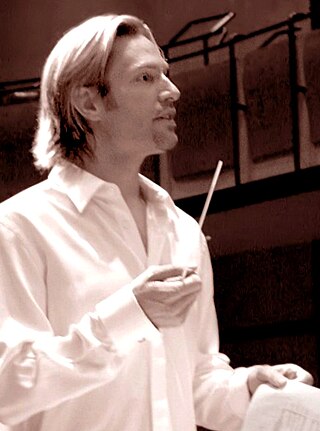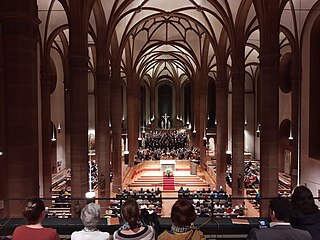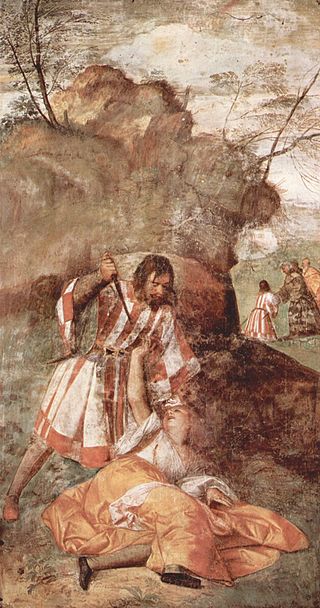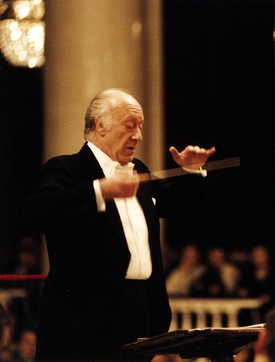Related Research Articles

Eric Edward Whitacre is a Grammy-winning American composer, conductor, and speaker best known for his choral music.

"Love's Philosophy" is a poem by Percy Bysshe Shelley published in 1819.

Arne Nordheim was a Norwegian composer. Nordheim received numerous awards for his compositions, and from 1982 lived in the Norwegian government's honorary residence, Grotten, next to the Royal Palace in Oslo. He was elected an honorary member of the International Society for Contemporary Music in 1997. On 18 August 2006, Arne Nordheim received a doctor honoris causa degree at the Norwegian Academy of Music. He died at the age of 78 and was given a state funeral.

"The Stolen Child" is an 1889 poem by William Butler Yeats, published in The Wanderings of Oisin and Other Poems.

Stephen Austin Wilkinson was a British choral conductor and composer.
Joseph Edward Twist is an Australian composer from Gold Coast, Queensland, who resides in the United States.
"Draumkvedet" is a Norwegian visionary poem, probably dated from the late medieval age. It is one of the best known medieval ballads in Norway. The first written versions are from Lårdal and Kviteseid in Telemark in the 1840s.

Antonín Dvořák's Stabat Mater, Op. 58 (B. 71), is an extended setting for vocal soloists, choir and orchestra of the 20 stanzas of the Stabat Mater sequence. Dvořák sketched the composition in 1876 and completed it in 1877. It has been characterized as a sacred cantata and as an oratorio, and consists of ten movements of which only the first and the last are thematically connected. Its total performance time is around 85 minutes.

Ana María Raga is a Venezuelan musician, choir and orchestra director, pianist, arranger, composer and teacher. She has won national and international prizes in the field of choral singing. She is the founder and president of the Aequalis Foundation.
Sleep is a composition for a cappella choir by Eric Whitacre, with lyrics by Charles Anthony Silvestri. He composed it in 2000, setting a poem, "Stopping by Woods on a Snowy Evening" by Robert Frost. When the lyrics were found still under copyright, Whitacre enlisted Silvestri to write new lyrics to the existing music.

Hymnus amoris, for soloists, choir and orchestra, Opus 12, is Carl Nielsen's earliest choral work. It was first performed at the Music Society (Musikforeningen) in Copenhagen on 27 April 1897 under the baton of the composer.

Marcus Nicolay Paus is a Norwegian composer and one of the most performed contemporary Scandinavian composers. As a classical contemporary composer he is noted as a representative of a reorientation toward tradition, tonality and melody, and his works have been lauded by critics in Norway and abroad. His work includes chamber music, choral works, solo works, concerts, orchestral works, operas, symphonies and church music, as well as works for theatre, film and television. Paus is regarded as "one of the most celebrated classical composers of Norway" and "the leading Norwegian composer of his generation."
Chöre für Doris, after poems by Paul Verlaine, is a three-movement a cappella choral composition by Karlheinz Stockhausen, written in 1950 and later given the number 1/11 in the composer's catalogue of works. The score is dedicated to the composer's future wife Doris.

Anine Susanne Kruse Skatrud is a Norwegian musician and choral conductor, the daughter of Professor of Music Gro Shetelig and the composer Bjørn Kruse, sister of actress and singers Jannike and Benedikte Kruse, and married to trombonist and bandleader Even Skatrud Andersen.

Martin Romberg is a Norwegian neo-romantic contemporary composer. He is one of the most active orchestral composers of his generation in Scandinavia. He is mostly known for his fantasy literature and inspired orchestral and choral works, notably treating themes and texts by J.R.R Tolkien, H.P. Lovecraft and Robert E. Howard, as well as pre-Christian, archaic and Celtic-Christian textual material.
The Beauty That Still Remains is a full-length choral work by Norwegian composer Marcus Paus, that is based on The Diary of a Young Girl by Anne Frank, and has received critical acclaim. It was commissioned by the Government of Norway for the official Norwegian 70th anniversary of the end of the Second World War in 2015, and written for the Norwegian Girls' Choir, historically the girl's choir of the Norwegian Broadcasting Corporation; it premiered in 2015 in the Atrium of the University of Oslo, and the premiere was opened by Minister of Defence Ine Marie Eriksen Søreide. It was released on the 2020 studio album The Beauty That Still Remains by the Norwegian Girls' Choir alongside Maja Ratkje's avant-garde choral work Asylos.
O salutaris hostia is a composition for choir a cappella by Vytautas Miškinis, a setting of the Latin prayer O salutaris hostia. Written in 1991, it was published by Carus in 2001. It has been performed in concerts internationally, and was recorded.
The Wild Choir is a poetry collection by Nobel laureate in literature Knut Hamsun. It was published in 1904 and is his only poetry collection. The collection contains existentialist, erotic and political poems. One of the best known poems from the collection is "Letter to Byron in the Great Beyond", addressed to the late English poet Lord Byron, one of Hamsun's role models. It also includes the poem "In a hundred years, all is forgotten". The collection has been set to music by different composers and musicians, including the album Bjørnstad/Paus/Hamsun (1982) by Ole Paus and Ketil Bjørnstad, the album Det Vilde Kor (2007) by Lumsk, and the operatic song cycle Det vilde Kor (2009) by Marcus Paus.

Yuri Alexandrovich Falik was a Russian composer, orchestral conductor, cellist, a board member of the Leningrad (Saint-Petersburg) branch of the Composers' Union, and People's Artist of Russia.

"Slava Ukraini!" is a 2022 song composed by the Norwegian composer Marcus Paus. It is based on the worldwide use of the expression "Glory to Ukraine" as a symbol of resistance and solidarity during the 2022 Russian invasion, and is loosely inspired by a motif from the opening of Ukraine's national anthem.
References
- 1 2 הנער ממקהלת "לירון" נהפך למנצח באחת המקהלות הנחשבות בגרמניה, Haaretz , 10. August 2020
- ↑ Poetry as an antidote: the story behind this anthology written by & for refugees, Scene Arabia
- ↑ Lara El Gibaly (July 24, 2017), Language, diaspora and suffering: In conversation with poet and aid worker Jehan Bseiso, Mada Masr
- 1 2 Friday Finds: A Conversation with Jehan Bseiso and Filmpoem ‘No Search, No Rescue’, Arablit Quarterly
- ↑ Jubileumskonsert for Norges Ungdomskor, Klassisk og Norsk Komponistforening, Komponist.no